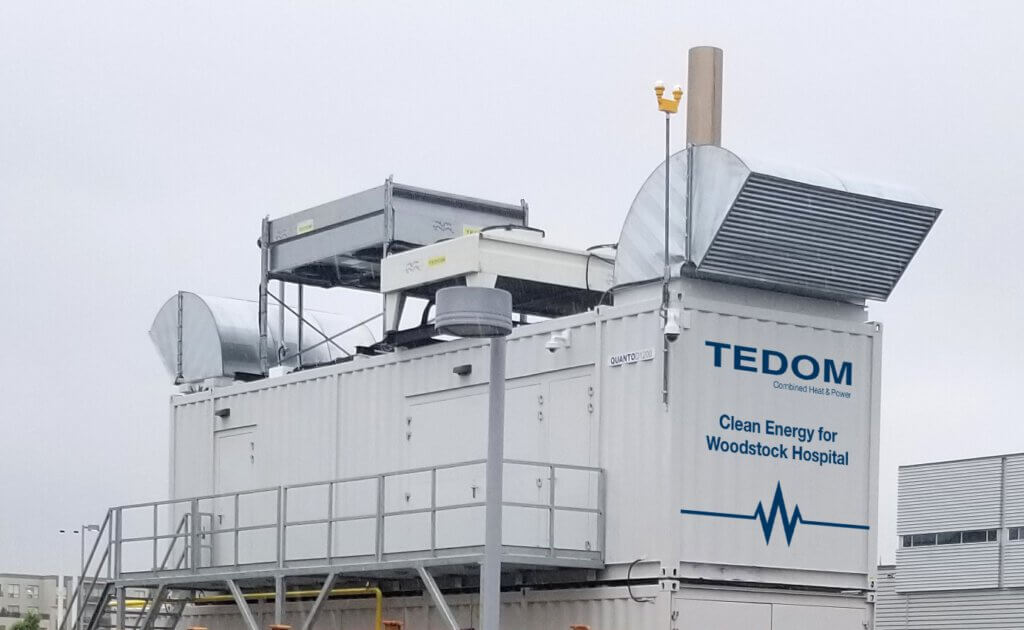
Another great advantage that cogeneration brings is the possibility to operate the CHP unit in a so-called island mode; in other words, independently of the main power grid. This brings another security element to the entire energy system. In critical cases of an outage of the main power grid, the energy required by the hospital can be supplied by the CHP unit separately, which makes it more resistant to long-term outages.
Project Objectives
Originally, the hospital in Woodstock, Canada, was heated by old gas boilers with a low efficiency. The hospital bought all their electrical energy from the power grid. Diesel generators provided backup power in the event of a grid supply failure. It was necessary to change this uneconomic model. The goal was to find a more efficient and environmentally friendly solution that would cover the year-round power consumption and make the hospital’s heating more efficient. Thus, via cogeneration, it is ensured that the hospital is largely independent and by doing so also saving the hospital on operational costs. It’s efficiency is around 86 %. The total financial return on the project is expected by approximately 5–6 years, all the while considering that the CHP unit’s design supports a lifespan of 20 years or more.
“What makes this unique is that not only are we getting electricity, we are taking the heat off the exhaust too, like when you touch a car muffler and it’s really hot. This heat will provide all the hot water as well as all the heating for the hospital building.” Christopher Marion, Director of Capital Projects, Woodstock Hospital, Canada

TEDOM Solution
Several challenges came with the installation that had to be kept in mind while designing the optimal solution. In this respect, we at TEDOM drew on 30 years of experience in the field of cogeneration to develop the solutions to meet this demanding project. A TEDOM QUANTO CHP unit with an MWM engine with a maximum output of 1200 kWe had to be limited to an output of 1047 kWe for this installation. The whole system was set up to cover the entire facility power consumption so that none of the power generated would be fed back to the grid.
The hospital is located near local development in the city, so it was therefore necessary to reduce emissions expelled into the air as much as possible to comply with local legislation. The parameters for this project were determined as follows:
- The emissions must not exceed 0.40 kg/MWh of NOX and 3.5 kg/MWh of CO2. These values were achieved through the use of an additional selective catalytic reduction (SCR) system.
- Secondly, the sound parameters must not exceed 55 dB at a distance of 10 meters.
Last but not least, close attention was also paid to a compact design which was achieved by using a stacked design where a part of the technology is built into the other container which is located above the actual (containerized) CHP unit.
The Result
The CHP unit was launched in July 2019. After 2 years of operation, it has already covered 16,700 operation hours and produced more than 16,615,000 kWh of electric energy. As a result, the CHP unit saves approximately 8,500,000 kg of CO2 per year in comparison to the previous solution. This output represents approximately 80% of the total annual power and heat consumption of the entire facility. Presently, the hospital produces its energy cheaper than the power the hospital had to purchase before when the heat was generated by gas boilers. Additionally, the CHP unit is also a safety element that will provide the hospital with sufficient energy in the event of main power grid outages.
TEDOM References
TEDOM has many years of experience in the field of hospital applications. In its 30 years of operation, TEDOM has delivered more than 150 biogas applications to 17 countries around the world. Of these, 5 applications are deployed directly in Canada (Guelph Hospital, Ontario Shores Centre for Mental Health Sciences, Battlefords Union Hospital, Timmins and District Hospital, and Woodstock). The CHP unit in the city of Woodstock is serviced by our long-standing and experienced Canadian partner, Total Power.



